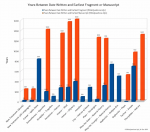- Joined
- Jun 11, 2017
- Messages
- 5,544
- Reaction score
- 1,061
- Location
- Arizona
- Gender
- Male
- Political Leaning
- Slightly Conservative
Your rhetorical question is intellectually dishonest and meaningless. Its like saying what would you do if you witnessed a real miracle. It makes assumptions about what was witnessed. It assumes the miracle took place. Well, miracles are subject of debate, not something we have to agree that could even be witnessed in the first place. It is a cheap debating trick.
If that's your understanding of my question then why on earth did you wait several days before raising this specific objection?
It doesn't make assumptions about what was witnessed it very clearly puts "miracle" in quotation marks, as a term indicating astonishment and inexplicability, asking what steps you'd take to pass on the details of such an observation IF you had witnessed it.
Asking what would you do "if X" is called a hypothetical question not an assumption, you yourself have asked these kind of questions, they are a common thing in such discussions, you've asked me "what would happen if you dropped a hammer that was held directly over your foot", a hypothetical question.
I'll gladly rephrase the question though if this specific format bothers you, then we can move on to what steps you'd take.
Your whole position now is founded upon the supposed impossibility of you witnessing and astonishing, inexplicable event, but you'd have to emphatically prove that in order to claim my hypothetical question is invalid.
I agree asking "what if X" where X is proven to be impossible is a grounds for rejecting the question but that simply is not the case here David.




